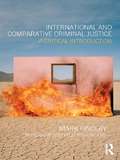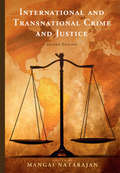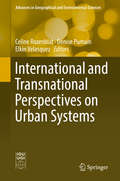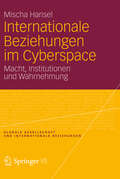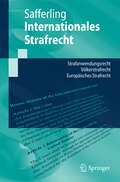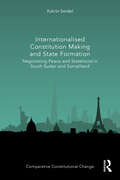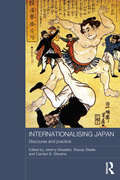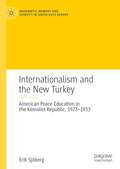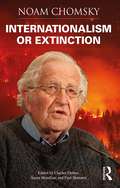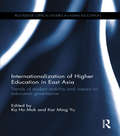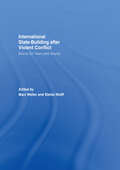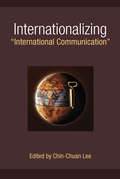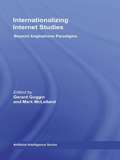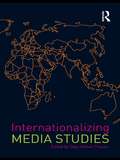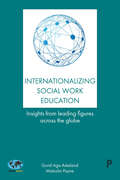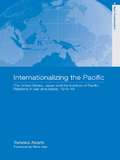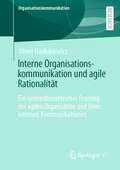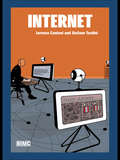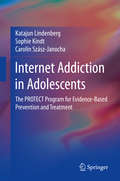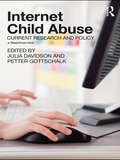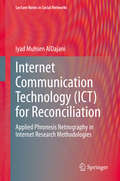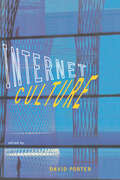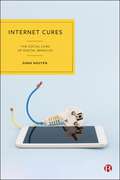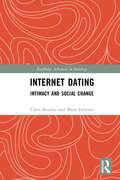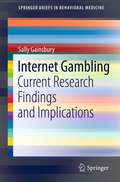- Table View
- List View
International and Comparative Criminal Justice: A critical introduction
by Mark J. FindlayInternational criminal justice is in transition. This book explores the growing internationalisation of criminal justice as a phenomenon of global governance. It provides students with a critical understanding of ?the international institutions for regulating transnational crime, the development of alternative justice processes across the globe, and international and supra-national co-operation criminal justice policies and practices. Key topics covered include: The historical development of International Criminal Justice institutions and traditions International Restorative Justice Victim communities and collaborative justice The relationship between crime and war International Human Rights The ‘War on Terror’ The globalisation of crime and control Developments in global governance, communitarian justice and accountability This text will familiarize students with the literature and debates surrounding international criminal justice and enable them to critically appreciate their theoretical and policy context. In doing so, it encourages students to assess the strengths and weaknesses of different approaches to the study of global justice and the analysis of comparative policy convergence and research. It will also help students to reflect on, and communicate in an informed and critical way theoretical accounts and empirical studies within the field of international criminal justice. This book will be essential reading for upper level undergraduates taking courses in criminal law, international relations and governance and postgraduates engaged in international criminal justice, international law, regulation and governance and human rights.
International and Transnational Crime and Justice
by Mangai NatarajanInternational crime and justice is an emerging field that covers crime and justice from a global perspective. This book introduces the nature of international and transnational crimes, theoretical foundations to understanding the relationship between social change and the waxing and waning of the crime opportunity structure, globalization, migration, culture conflicts, and the emerging legal frameworks for their prevention and control. It presents the challenges involved in delivering justice and international cooperative efforts to deter, detect, and respond to international and transnational crimes; and the need for international research and data resources to go beyond anecdote and impressionistic accounts to testing and developing theories to build the discipline that bring tangible improvements to the peace, security and well-being of the globalizing world. A timely analysis of a complex subject of international crime and justice for students, scholars, policymakers and advocates who strive for the pursuit of justice for millions of victims.
International and Transnational Perspectives on Urban Systems (Advances in Geographical and Environmental Sciences)
by Celine Rozenblat Denise Pumain Elkin VelasquezThis book reviews the recent evolutions of cities in the world according to entirely revised theoretical fundamentals of urban systems. It relies on a vision of cities sharing common dynamic features as co-evolving entities in complex systems. Systems of cities that are interdependent in their evolutions are characterized in the context of that dynamics. They are identified on various geographical scales—worldwide, regional, or national. Each system exhibits peculiarities that are related to its demographic, economic, and geopolitical history, and that are underlined by the systematic comparison of continental and regional urban systems, following a common template throughout the book. Multi-scale urban processes, whether local (one city), or within national systems (systems of cities), or linked to the expansion of transnational networks (towards global urban systems) throughout the world over the period 1950–2010 are deeply analyzed in 16 chapters. This global overview challenges urban governance for designing policies facing globalization and the subsequent ecological transition. The answers, which emerge from the diversity of situations in the world, add some reflections on and recommendations to the “urban system framework” proposed in the Habitat III agenda.
Internationale Beziehungen im Cyberspace
by Mischa HanselDer Cyberspace gilt als Domäne der Gesellschaftswelt. Kleine Hackergruppen führen "Cyberkriege", "Cyberdissidenten" machen "Revolutionen" und "virtuelle Gemeinschaften" transzendieren die politische Geographie. Mischa Hansel relativiert derlei radikale Transformationserwartungen und macht für den tatsächlichen Einflussverlust der Staaten vor allem deren mangelnde Kooperationsbereitschaft verantwortlich. Am Beispiel der Cybersicherheit wendet der Autor neo-realistische, neo-institutionalistische und psychologische Ansätze auf die Problematik der zwischenstaatlichen Kooperation im Cyberspace an.
Internationales Strafrecht
by Christoph SafferlingDer Band bietet eine systematische Einführung in das Strafanwendungsrecht, das Europäische Strafrecht nach dem Lissabon-Vertrag sowie das Völkerstrafrecht auf der Grundlage des Internationalen Strafgerichtshofs. Zahlreiche Beispielfälle dienen der Erläuterung und der Vertiefung des Lernstoffs. Übersichten und Prüfungsschemata helfen, den Überblick zu behalten. Ein besonderes Augenmerk liegt auf der Darstellung den historischen und kriminalpolitischen Rahmenbedingungen sowie auf der methodischen Herleitung.
Internationalised Constitution Making and State Formation: Negotiating Peace and Statehood in South Sudan and Somaliland (Comparative Constitutional Change)
by Katrin SeidelThis book presents an in-depth and nuanced interdisciplinary and comparative analysis of (post-)conflict constitution-making in South Sudan and Somaliland, exploring the ways in which the two emerging states negotiate statehood in a globalised world. It critically examines the transfer of international constitution-making models as part of international rule of law promotion frameworks. Specific emphasis is placed on the socio-cultural translation dynamics of these models in conflict settings. The comparative study explores the tensions between state sovereignty and international interventions, examining whether international constitution-making involvement fosters the production of societal consensus or inadvertently impedes efforts to achieve stability and peace. By focusing on constitutional law-making, the book sheds light on how normative ideas are transformed in negotiations and opens up new analytical avenues for re-thinking conventional constitution-making practices. It critically reconsiders the assumption that every emerging state requires a written constitution, alongside the state-centred notion of sovereignty underpinning this paradigm. Additionally, the study addresses the power and knowledge hierarchies inherent in international interventions, providing empirical data from post-conflict African contexts. The book will be of interest to academics, researchers, and policy-makers working in the areas of comparative public law, constitutionalism, sociology of law, anthropology, legal geography, international relations, political science, and African studies.
Internationalising Japan: Discourse and Practice (Routledge Contemporary Japan Series)
by Jeremy Breaden Carolyn S. Stevens Stacey SteeleIn the twenty-first century, the concept of internationalisation remains a crucial tool for understanding the dynamics of globalising processes. It draws attention to the dimensions of conscious action in inter- and trans-national phenomena, connecting globalisation with individuals’ experience of everyday life. This book explores how internationalisation is imagined, discussed and operationalised in Japan and surrounding countries. The chapters focus on educational, leisure and cultural activities, fields which are often overlooked in favour of economic and political developments in the literature. The conclusion reflects on the concept of internationalisation and assesses how it is likely to develop in Japan in future, taking into account the impact of the Great East Japan Earthquake of 2011.
Internationalism and the New Turkey: American Peace Education in the Kemalist Republic, 1923-1933 (Modernity, Memory and Identity in South-East Europe)
by Erik SjöbergThis book examines international education in Turkey after World War I. In this period, a movement for peace and international education among American educators emerged. This effort, however, had to be reconciled with the nationalist projects of new nation-states emerging from the war. In the case of the Near East that meant coming to terms with the radically nationalist modernization project of Kemal Atatürk’s Turkish Republic. Using the case of Robert College, an American educational institution in Istanbul, which aimed to foster a future local elite of a multi-ethnic and multi-religious student body, the book sheds light on the negotiation between two conceptions of modernity, as represented by American internationalist ideals and the tenets of Kemalism the Westernizing, yet deeply ethnocentric national ideology of post-1923 Turkey. Based on recently declassified archival sources, this study addresses the educational intentions and strategies for adjustment of college faculty. It also offers a rare insight into the mindset of young students attempting to make sense of what internationalism and religious, ethnic and national identity meant in the Ottoman past and in the new republican Turkey. Focusing on Robert College and the forgotten case of its dean and social studies instructor, Dr. Edgar Jacob Fisher, it addresses the little-researched field of internationalism and peace education in interwar Turkey.
Internationalism or Extinction (Universalizing Resistance)
by Noam ChomskyIn his new book, Noam Chomsky writes cogently about the threats to planetary survival that are of growing alarm today. The prospect of human extinction emerged after World War II, the dawn of a new era scientists now term the Anthropocene. Chomsky uniquely traces the duality of existential threats from nuclear weapons and from climate change—including how the concerns emerged and evolved, and how the threats can interact with one another. The introduction and accompanying interviews place these dual threats in a framework of unprecedented corporate global power which has overtaken nation states’ ability to control the future and preserve the planet. Chomsky argues for the urgency of international climate and arms agreements, showing how global popular movements are mobilizing to force governments to meet this unprecedented challenge to civilization’s survival.
Internationalization of Higher Education in East Asia: Trends of student mobility and impact on education governance (Routledge Critical Studies in Asian Education)
by Ka Ho Mok Kar Ming YuThe rise in demand for higher education in the Asia-Pacific region is an undeniable reflection of the growing pace of globalization and the subsequent pressures imposed by it. Aspiring to become globally competitive and to position favourably in the global university league tables, governments in Asia have either engaged in a serious quest to become a regional education hub or they have concentrated on developing transnational higher education to create more opportunities, in order to meet their citizens’ pressing demand for higher education. Internationalization of Higher Education in East Asia critically examines and provides comparative perspectives on the major strategies that selected Asian countries and societies have adopted to transform their higher education sector and enhance their national competitiveness in the increasingly globalized world. This volume by leading scholars in the field of education development and policy studies makes critical reflections on how Asian governments in particular and universities in general have responded to the growing challenges of globalization by promoting more internationalization, student mobility and entrepreneurship in higher education. This book is an essential collection for policy makers, researchers and postgraduate students studying higher education, Asian education and international education.
Internationalized State-Building after Violent Conflict: Bosnia Ten Years after Dayton (ISSN)
by Stefan Wolff Marc WellerPreviously published as a special issue of Ethnopolitics, this volume analyzes various dimensions of the internationalized state-building process in Bosnia and Herzegovina since 1995. In December 1995, the Dayton Agreements ended the war in Bosnia and Herzegovina and established a fragile peace between the former conflict parties. The settlement seemed morally wrong and politically impracticable, but still necessary in order to end violence of a scale and intensity not seen in Europe since the end of the Second World War. The leading contributors conclude that internationalized state-building can only serve well in the stabilization of states emerging from conflict if it draws on a well-balanced approach of consociational techniques, moderated by integrative policies, tempered by a wider regional outlook and sustained by resourceful and skilled international involvement. The experience of Bosnia and Herzegovina may not have scored full marks in all of these categories, but important lessons can be gleaned for other similar contemporary and future challenges that the international community no doubt will have to face.This book will be of interest to students and scholars of international organizations, civil wars and ethnic conflicts, international law and peace studies.
Internationalizing "International Communication"
by Chin-Chuan LeeInternational communication as a field of inquiry is, in fact, not very "internationalized." Rather, it has been taken as a conceptual extension or empirical application of U.S. communication, and much of the world outside the West has been socialized to adopt truncated versions of Pax Americana's notion of international communication. At stake is the "subject position" of academic and cultural inquirers: Who gets to ask what kind of questions? It is important to note that the quest to establish universally valid "laws" of human society with little regard for cultural values and variations seems to be running out of steam. Many lines of intellectual development are reckoning with the important dimensions of empathetic understanding and subjective consciousness. In Internationalizing "International Communication," Lee and others argue that we must reject both America-writ-large views of the world and self-defeating mirror images that reject anything American or Western on the grounds of cultural incompatibility or even cultural superiority. The point of departure for internationalizing "international communication" must be precisely the opposite of parochialism - namely, a spirit of cosmopolitanism. Scholars worldwide have a moral responsibility to foster global visions and mutual understanding, which forms, metaphorically, symphonic harmony made of cacophonic sounds.
Internationalizing Internet Studies: Beyond Anglophone Paradigms (Routledge Advances in Internationalizing Media Studies)
by Gerard Goggin Mark McLellandThis timely book offers a mapping of the Internet as it has developed and is used internationally, providing a lively and challenging examination of the Internet and Internet studies. There is much interest among scholars and researchers in understanding the place of the Internet in cultural, social, national, and regional settings. This is the first book-length account that not only provides a range of perspectives on the international Internet, but also explores the implications of such new knowledge and accounts for concepts, methods, and themes in Internet studies. Of special interest will be the book’s fresh and up-to-date coverage of the Internet in perhaps the most dynamic region at present: Asia-Pacific.
Internationalizing Media Studies (Internationalizing Media Studies)
by Daya Kishan ThussuThe explosion of transnational information flows, made possible by new technologies and institutional changes (economic, political and legal) has profoundly affected the study of global media. At the same time, the globalization of media combined with the globalization of higher education means that the research and teaching of the subject faces immediate and profound challenges, not only as the subject of enquiry but also as the means by which researchers and students undertake their studies. Edited by a leading scholar of global communication, this collection of essays by internationally-acclaimed scholars from around the world aims to stimulate a debate about the imperatives for internationalizing media studies by broadening its remit, including innovative research methodologies, taking account of regional and national specificities and pedagogic necessities warranted by the changing profile of students and researchers and the unprecedented growth of media in the non-Western world. Transnational in its perspectives, Internationalizing Media Studies is a much-needed guide to the internationalization of media and its study in a global context.
Internationalizing Social Work Education: Insights From Leading Figures Across the Globe
by Malcolm Payne Gurid Aga AskelandSocial work education has developed internationally over the past 50 years as part of wider processes of economic and cultural globalization. Diverse political and social events across the world have shaped social work and its education, leading to aims and methods that are shared and contested. This book brings together, through 13 interviews and biographies, the lives, experiences and contributions of leading social work educators from Comoros, the Caribbean, India, Mexico, Sweden, Switzerland, the United States and the United Kingdom. Their receipt of IASSW’s Katherine Kendall Award recognized that they were at the forefront of establishing and securing social work education during this period of internationalization. Exploring the aims and priorities of these leading social work educators, Askeland and Payne draw out a historical and contextual account of how social work education became widely adopted in different national and cultural environments. The Awardees’ diverse lives and professional experiences reveal the issues they faced, the paths they travelled and the prospects and threats confronting social work and its education more widely.
Internationalizing the Pacific: The United States, Japan and the Institute of Pacific Relations, 1919-1945 (Routledge Studies in Asia's Transformations)
by Tomoko AkamiThe Institute of Pacific Relations was a pioneering intellectual-political organization that shaped public knowledge and both elite and popular discourse throughout the Asia-Pacific region and beyond during the inter-war years. Inspired by Wilsonian internationalism after the 1919 formation of the League of Nations, it grew to become an international and national non-governmental think-tank providing expertise on Asia and the Pacific. This book investigates post-League Wilsonian internationalism with respect to two critical issues: the nation state and the conception of the Asia-Pacific region; both issues broach a range of contentious subjects including colonialism, orientalism, racism and war. Akami's study of the Institute of Pacific Relations offers insight into the formation of the dominant ideologies and institutions of regional and international politics in the Pacific during the inter-war years, and provides an interesting perspective on Japan's relations with countries including the USA and Australia.
Interne Organisationskommunikation und agile Rationalität: Ein systemtheoretisches Framing der agilen Organisation und ihrer internen Kommunikationen (Organisationskommunikation)
by Oliver HaidukiewiczSeit Ende der 90er-Jahre kursiert das Konzept der Agilität in der Organisationsforschung und versucht vor allem für Unternehmen zu eruieren, wie qua Schnelligkeit und Flexibilität der Unternehmensprozesse mit steigender Umweltvolatilität und -ambiguität umgegangen werden kann. Dominierend sind dabei managementorientierte Betrachtungen von Führung, Strategie, Kultur und vor allem Struktur. In sie werden in jüngerer Zeit zunehmend Vorstellungen einer internen, stationären Organisationskommunikation integriert, die klassisch-instrumenteller Natur sind und die das Konzept innerhalb der Organisation fördern, umsetzen und anleiten sollen. Wenig Beachtung finden hingegen aktuell noch kritische Stimmen zur Agilität, die einen Gegenpol zur ausschließlichen Befürwortung zweckorientierter Agilisierungen bilden. Die vorliegende Arbeit fragt zum einen danach, was passiert, wenn das spezifische Konzept der Agilität aus einem Management- und stark Akteurs-orientierten Betrachtungsrahmen herausgelöst und mit einer neuen, systemtheoretisch geprägten Organisationsauffassung nach Luhmann synthetisiert wird und eruiert zum anderen, was dies für Implikationen für die bisherigen Sichtweisen der internen Organisationskommunikation in Verbindung mit dem Konzept hat.
Internet
by Lorenzo Cantoni Stefano TardiniFrom music to gaming, information gathering to eLearning; eCommerce to eGovernment, Lorenzo Cantoni and Stefano Tardini's absorbing introduction considers the internet as a communication technology; the opportunities it affords us, the limitations it imposes and the functions it allows. Internet explores: the political economy of the internet hypertext computer mediated communication websites as communication conceptualizing users of the internet internet communities and practices. Perfect for students studying this modern phenomenon, and a veritable e-feast for all cyber junkies.
Internet Addiction in Adolescents: The PROTECT Program for Evidence-Based Prevention and Treatment
by Katajun Lindenberg Sophie Kindt Carolin Szász-JanochaThis book presents a new, evidence-based cognitive behavioral intervention for the prevention and treatment of Internet addiction in adolescents. It provides a comprehensive overview of the current state of research regarding phenomenology, diagnostics, epidemiology, etiology, and treatment and prevention of Internet addiction as a new behavioral addiction. The book is divided into two sections. The first part of the book explores various bio-psycho-social factors that contribute to the development and maintenance of symptoms in young individuals. Chapters in the second part of the book discuss the PROTECT intervention to reduce Internet addiction in adolescents. PROTECT aims to modify risk factors and maintenance factors, specifically, boredom and motivational problems, procrastination and performance anxiety, social anxiety and maladaptive emotion regulation. The PROTECT intervention is a low-intensity approach which uses comprehensive case examples in order to increase cognitive dissonance and treatment motivation. In addition, PROTECT contains cognitive behavioral intervention techniques such as psychoeducation, behavior activation, cognitive restructuring, problem solving and emotion regulation. Topics featured in this book include:Adolescence and development-specific features of Internet addiction.An overview of modifiable risk factors and maintenance factors of Internet addiction.Environmental factors that affect the development of Internet addiction.Online and offline video gaming addiction. Social network addiction.Strategies that work in prevention and treatment. Internet Addiction in Adolescents is a must-have resource for researchers, professors, clinicians and related professionals as well as graduate students in clinical child, school, and developmental psychology, educational policy and politics, and social work as well as related disciplines.
Internet Child Abuse: Current Research and Policy
by Julia DavidsonInternet Child Abuse: Current Research and Policy provides a timely overview of international policy, legislation and offender management and treatment practice in the area of Internet child abuse. Internet use has grown considerably over the last five years, and information technology now forms a core part of the formal education system in many countries. There is however, increasing evidence that the Internet is used by some adults to access children and young people in order to ‘groom’ them for the purposes of sexual abuse; as well as to produce and distribute indecent illegal images of children. This book presents and assesses the most recent and current research on internet child abuse, addressing: its nature, the behaviour and treatment of its perpetrators, international policy, legislation and protection, and policing. It will be required reading for an international audience of academics, researchers, policy-makers and criminal justice practitioners with interests in this area.
Internet Communication Technology: Applied Phronesis Netnography in Internet Research Methodologies (Lecture Notes in Social Networks)
by Iyad Muhsen AlDajaniThe book explores Applied Phronesis in internet communication technology and Netnography application, introducing it on Facebook and YouTube usages. It defines two pillars for the research dynamics, “Episteme” and “Techne.” – the know-how, how-to, and the power dynamics. The “Episteme” explores the dynamics of reconciliation in the middle of conflict, Internet communication technologies for transformation, Moderation in Islam, online Deliberative Democracy.The second pillar, “Techne,” is explored through Internet communication technology for the advancement of reconciliation in the middle of a conflict.The book describes the Phronetic Approach in internet research in academic discourse adopting Phronesis “an Aristotelian concept and method defined by Bent Flyvbjerg,” and exploring Netnography for Kozinets, in Mixed-Method research design and applying methodological triangulation in research and testing the hypothesis using qualitative content analysis for Krippendorff, developing a methodological discourse for interdisciplinary research using internet communication technologies as part of understanding big-date, introducing Applied Digital Humanities.
Internet Culture
by David PorterThe internet has recently grown from a fringe cultural phenomenon to a significant site of cultural production and transformation. Internet Culture maps this new domain of language, politics and identity, locating it within the histories of communication and the public sphere. Internet Culture offers a critical interrogation of the sustaining myths of the virtual world and of the implications of the current mass migration onto the electronic frontier. Among the topics discussed in Internet Culture are the virtual spaces and places created by the citizens of the Net and their claims to the hotly contested notion of "virtual community"; the virtual bodies that occupy such spaces; and the desires that animate these bodies. The contributors also examine the communication medium behind theworlds of the Net, analyzing the rhetorical conventions governing online discussion, literary antecedents,and potential pedagogical applications.
Internet Cures: The Social Lives of Digital Miracles
by Dang NguyenIn health care, we come across daily promises of miraculous cures for various ailments. However, in the digital era, the dynamics of experiencing and practicing these remedies have changed. This book explores the intersection of miracle cures and technology, showcasing their transformation into hybrid forms, such as handwritten recipes captured in photos or tutorials streamed through videos. Combining computational social media data with ethnographic insights from Vietnam and the US, the book captures the interconnected lives of these cures in the digital realm with a unique methodology. Unravelling the intricate connections between social, technological, biomedical and non-biomedical spheres, this is a significant contribution to how social scientists study online media.
Internet Dating: Intimacy and Social Change (Routledge Advances in Sociology)
by Chris Beasley Mary HolmesInternet Dating deals primarily with the experiences of UK and Australian daters, examining their online accounts to see what kinds of narratives, norms, emotions and ‘chemistry’ shape their dating. Has the emergence and growth of internet dating changed the dating landscape for the better? Most commentators, popular and academic, ask whether online dating is more efficient for individuals than offline dating. We prefer a socio-political perspective. In particular, the book illustrates the extent to which internet dating can advance gender and sexual equality. Drawing on the voices of internet daters themselves, we show that internet dating reveals how social change often arises in the unassuming, everyday and familiar. We also pay attention to often ignored older daters and include consideration of daters in Africa, Scandinavia, South America, Asia and the Middle East. Throughout, we explore the pitfalls and pleasures of men and women daters navigating unconventional directions towards more equitable social relations.
Internet Gambling
by Sally GainsburyInternet gambling is one of the fastest growing forms of gambling. Global Internet gambling expenditure is predicted to reach US$33.6 billion in 2011. This is higher than worldwide movie box office revenues and represents 9% of the international gambling market. The rapid increase in expenditure of 354% since 2003 has occurred despite Internet gambling being prohibited in several key markets, including the US and China. It also suggests that current regulation may be somewhat outdated and ineffective as more and more people turn to this mode of gambling. Internet gambling is highly accessible with over 2,400 sites available 24/7 through computers, mobile phones, wireless devices and even interactive televisions. Gamblers can now play casino games, bingo, cards and poker, bet on races, sports and even celebrity weddings using over 199 means of electronic payments without leaving the house. Increasing international jurisdictions are legalizing Internet gambling and the constant accessibility of online gambling has critical social implications. Gambling operators are using aggressive advertising campaigns to move into new markets. Internet gambling appears to be particularly appealing to youth, who are gambling online at substantially higher rates than adults. Furthermore, Internet gambling appears to be related to problem gambling, with rates of problem gambling three to four times higher among Internet than non-Internet gamblers, indicating that it may have a substantial social cost. The anonymity of online sports betting poses a significant threat to the integrity of sport at all levels with increasing allegations of match-fixing and cheating. Estimates suggested that 50% of all bets on the 2010 FIFA World Cup were placed online, worth an estimated £500 million. These figures represent a 700% rise in online betting since the 2006 tournament and included many new players that opened online accounts. It is essential that appropriate responses are made by governments, industry professionals and the public in response to Internet gambling. This book will provide a comprehensive and up-to-date overview of Internet gambling, including the social impact and regulatory options. A global outline will include the characteristics and features of the many forms of Internet gambling, including the current market, and participation, and differences between Internet and non-Internet gambling. Specific regional considerations will be explored including regulatory responses and options. Importantly, the social consequences and costs of Internet gambling will be examined, including the impact of online gambling on sports, youth and problem gambling. Strategies for prevention and responsible gambling will be considered as well as expected trends.
